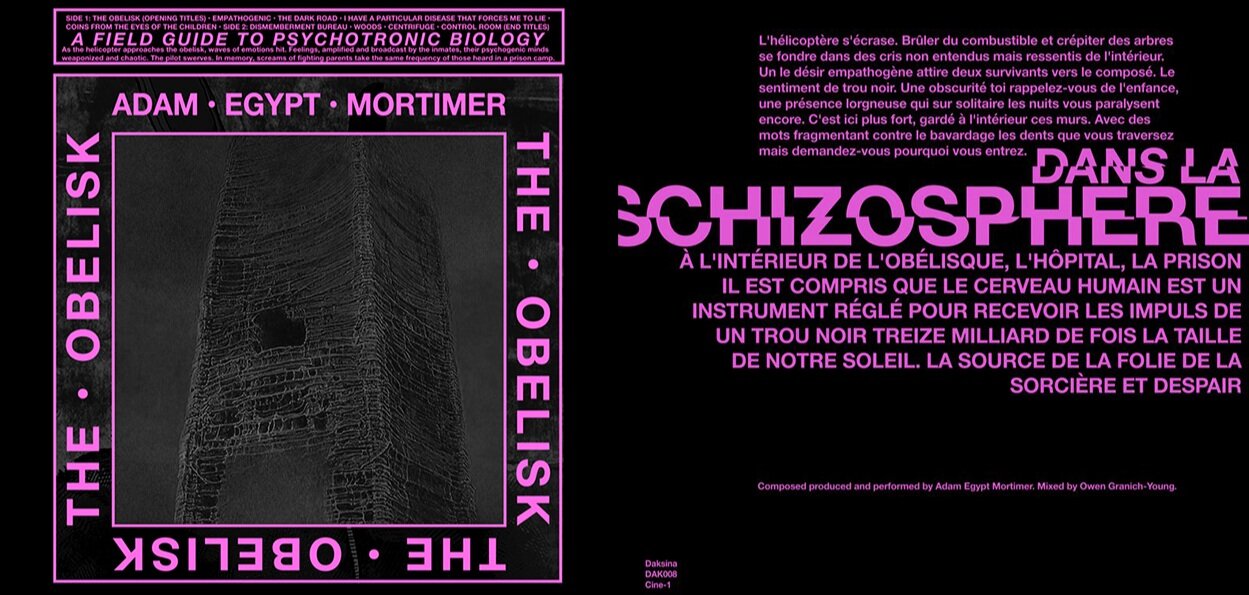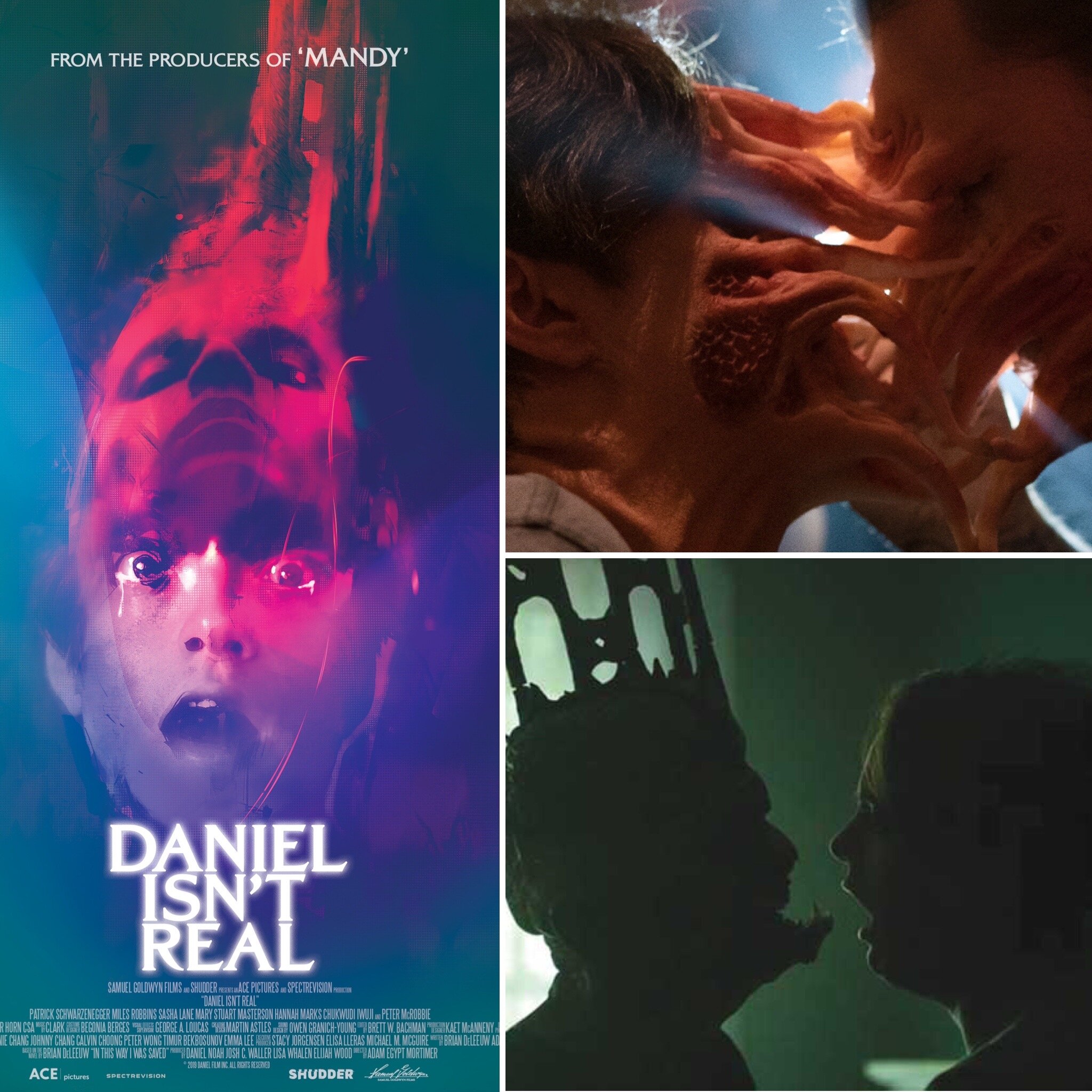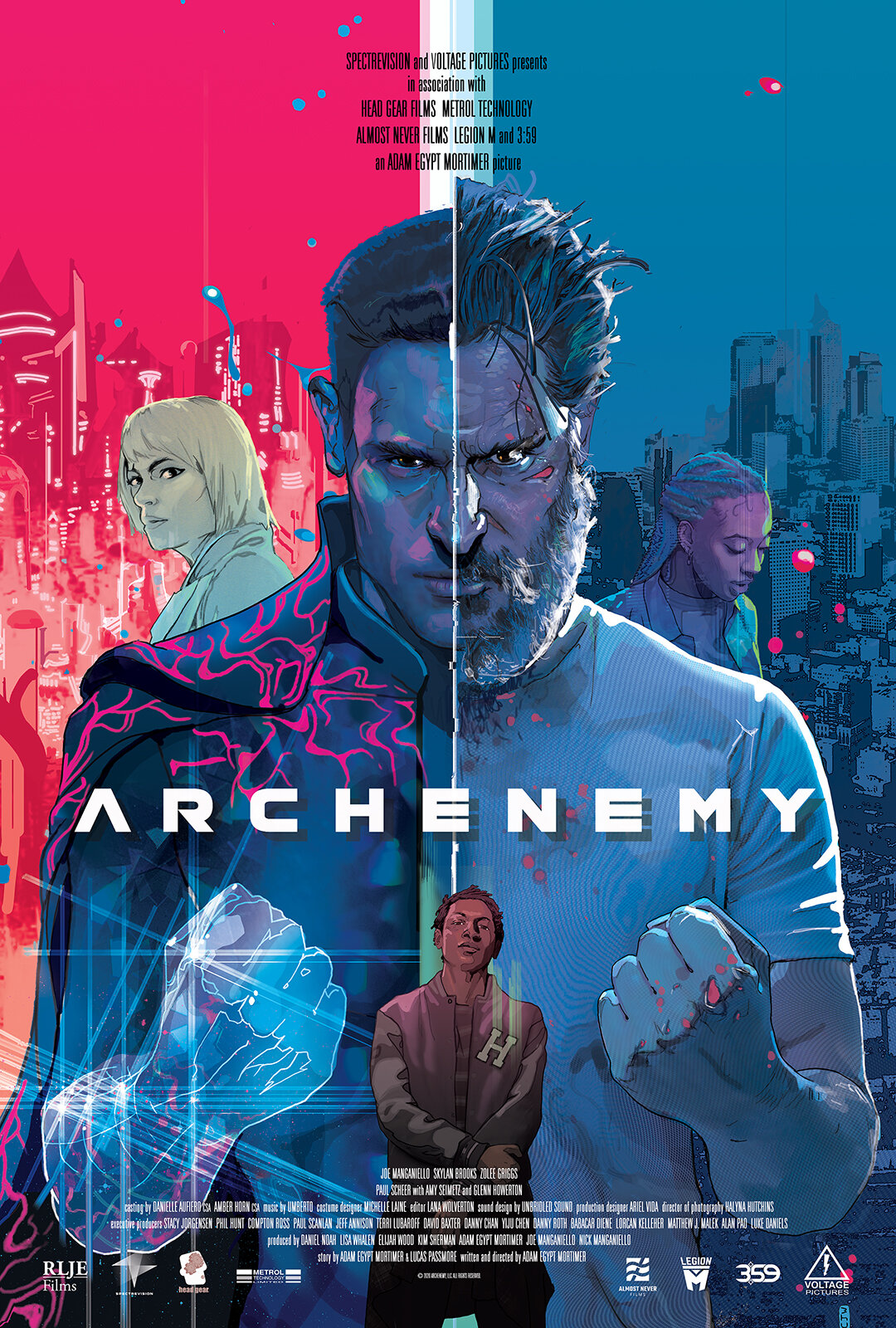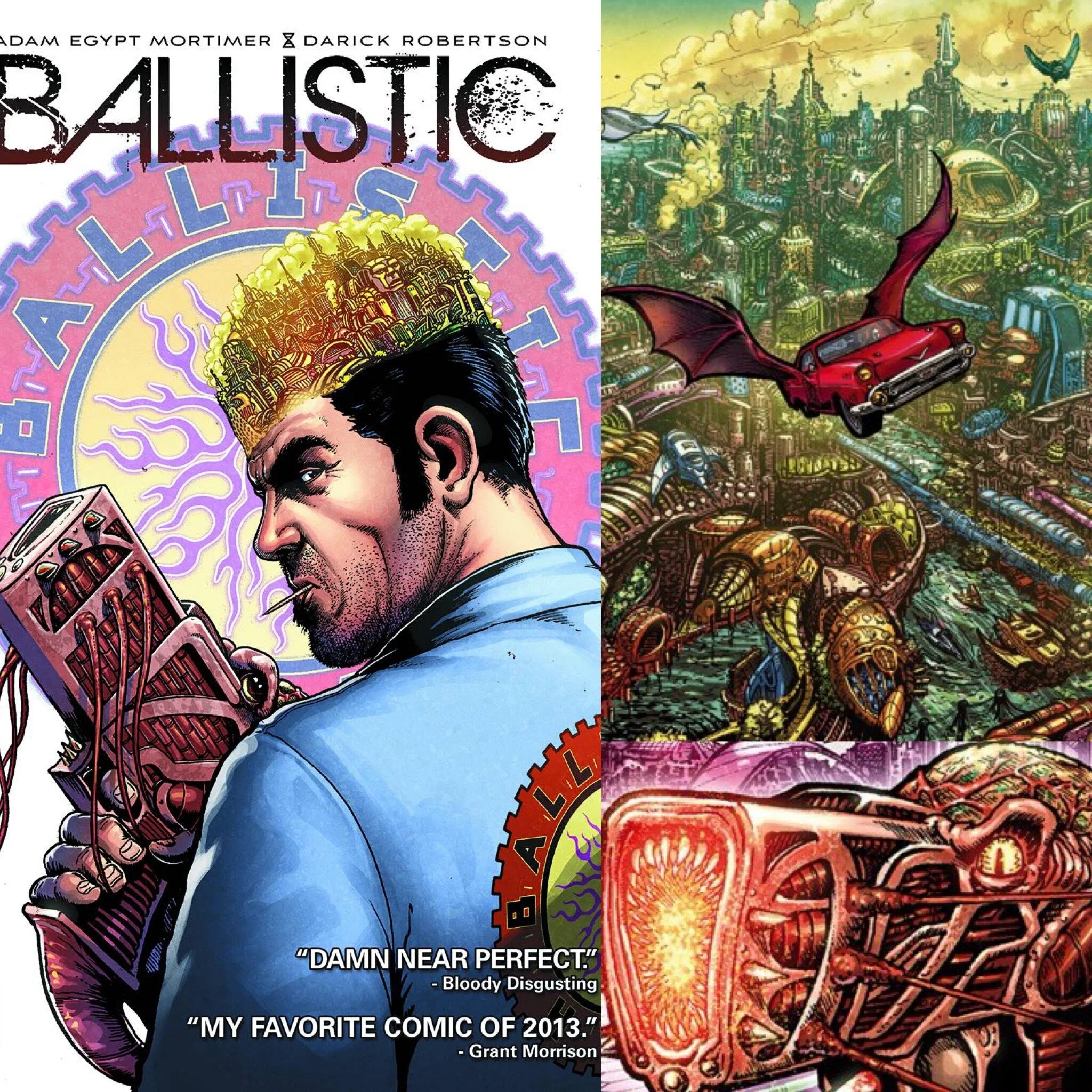The Obelisk OST (2021)
There’s an odd phenomenon where you don’t connect dots between multiple works being done by the same person. For example, despite watching all three films countless times growing up, I never realized that Porkins in STAR WARS, Major Eaton (“Top. Men.”) in RAIDERS OF THE LOST ARK, and BATMAN 1989’s Eckhardt were all played by the same actor—William Hootkins. Perhaps it’s a testament to the artist’s work that these ties are not known until much later (and then you can’t help but see it and feel it’s obvious in retrospect). Or maybe there’s just some sort of block sorting brains do in separating various aspects of life and entertainment which makes the overlap unlikely to happen.
This capricious blindness occurred when watching DANIEL ISN’T REAL. The 2019 film is a melding of FIGHT CLUB, DROP DEAD FRED, THE STRANGE ONES, mental illness parable, coupled with a cosmic darker mythology written/directed by Adam Egypt Mortimer. The film has strong performances propelling compelling sequences, some that include a body-horror/mutative/biological grotesquerie element. Even with some uneven parts, I was impressed by the movie’s unique tackling of bold issues with memorably bizarre imagery.
Mortimer’s follow up effort, ARCHENEMY, was another twist on familiar tropes with the central character (Joe Manganiello) either being delusional, an addict, a cross-dimensional superhero, or some amalgam of all three. The filmmaker once again elicited memorable turns by his cast and injected comic book-style art to signify events that may have taken place in this other dimension/planet. While it is flawed (what works aren’t?), there remains in ARCHENEMY a take on familiar territory from a previously unexplored angle while using innovative visuals to further a sense of otherness. And that’s when it hit me. Well, to be precise, that’s when I remembered seeing the name Adam Egypt Mortimer before.
Back in 2015, I read an odd comic book called Ballistic that was a melding of pulp, sci-fi, and horror taking place in a world of biotechnological wizardry. Drawn by Darick Robertson (The Boys), Ballistic was collision of styles from the types like China Mieville, David Cronenberg, Geoff Darrow, Katsuhiro Otomo, and more into a fun adventure. Well…it turns out that the writer behind the five part mini-series was Adam Egypt Mortimer. A connection I didn’t make until I was looking up information about ARCHENEMY and it all clicked together.
Thus I discovered that Mortimer had been on my radar longer than I thought, creating unique worlds to tackle intriguing topics told in innovative manner.
The artist’s latest project (well, one of them) is a musical soundscape called The Obelisk. I first stumbled upon this via a write up in Fangoria where Mortimer described this new endeavor. I happen to have a soft spot for “fake” soundtracks—that is to say a collection of songs/tracks meant to evoke emotions along with certain imagery and storytelling beats. This fondness is part of the reason behind Neon Splatter’s My Mixtape’s A Masterpiece feature. When listening to music, I have a tendency to craft a visual representation in my head; not abstract colors or shapes, but the song becomes an audio backdrop for some scene. It could be a piece of an imaginary movie, book, TV show, or whatever but that’s how my mind works (I know a few other people that have this behavior, but it doesn’t seem particularly prevalent amongst folks). Thus playlists or an album becomes part of a larger story playing out in my mind.
In addition to my inclination to create visual representations in my imagination, there’s also a history of musicians creating soundtracks to films that do not exist. Clearly there’s a fine line between the concept album and the musical work that would accompany specific imagery. The Protomen have multiple albums that act as the framing devices for a larger story, complete with liner notes that flesh out the scenes in between the song. Perturbator’s Sexualizer EP is also an immersive narrative that evokes certain visuals. Before becoming a go-to composer for Soderbergh, David Holmes did a dry run with his own album called This Film's Crap, Let's Slash the Seats that was meant to be a soundtrack for a non-existent movie. Symmetry (a group led by Johnny Jewel of Glass Candy and Chromatics) released Themes For an Imaginary Film after Nicolas Winding Refn discarded their score for DRIVE in favor of one made by Cliff Martinez.
This is all to say that there is a tradition of this type of musical work, that I’m an already primed audience for this album, and that Mortimer’s particular aesthetic resonates with me. All of those caveats aside, The Obelisk is a thoroughly engaging bit of darksynth that evokes Steve Moore/Zombi and Perturbator with elements of post-rock phantasmagoria one could find in Break My Fucking Sky or Mastodon’s score for JONAH HEX. Mortimer’s work definitely feels like a descendant from any number of synth/electronic scores for horror films (mostly in the ‘80s, though there has been a resurgence). Obelisk works best listening to while lying down and zoning out—allowing the music to paint ornate images of this archaic world inside one’s mind. For those that want to create a creeping sense of dread matched with the occasional apocalyptic bombast, Mortimer has made a great score to accompany such a journey into doom.
Mortimer summarizes the story of The Obelisk thusly:
I imagined a movie. The movie, made in 2029, begins as Two Lovers drive through an unending forest — already we are disoriented — Germany? Russia? The Ozarks? And then a crash. They find their way to The Obelisk — a walled asylum built on the edge of the Black Sun. The doctors here are in fact Psychotronic Biologists; the inmates are tunnels to the edge-of-the-cosmos source of witchcraft, despair, and power. The Lovers fight against the impulse to transform their own flesh. They fight the nightside sister-entities Morbida, Destruda, and Libida. Soon our own childhood traumas and fears merge onto the screen as demonic inmates watch “mind movies” projected in beams of light from their own skulls. By the end, the audience is rooting for the destruction of The Obelisk — both the movie and the structure depicted within — while our heroine, harrowed by humanity’s damage-made-flesh, attempts to resurrect her lover using the occult controls at the heart of the facility.
This movie from the future seemed to be projected back to my own mind, echoing from the Outer Gateways. My score is a recapturing of the movie beginning with the opening credits overture and a journey through The Dark Road, through the agonies of telepathic destruction and the psychic landscape of the Woods. It ends in the hellish evocation of a Centrifuge and an epiphany about what is controlled by the Control Room.
The album is split into two parts (essentially two halves of a record), each running a little over 20 minutes. I would’ve preferred shorter tracks to better convey scene transitions and changing pieces of narrative in a movie. The longer compositions make sense when looking at Mortimer’s style—a flowing dreamlike sense of connective tissue moving together in a spooky world of both/and rather than either/or (to paraphrase Freud)—but that minor change may have made the work stronger.
The combination of familiar synth beats, discordant sounds, and heartfelt melodies all layered on top of each other provide a keen sense of chaos but one that was intelligently designed by the artist. It is a mounting fear spiraling downward that could be seen as the mutant child of Nine Inch Nails’ Ghosts and the PRINCE OF DARKNESS soundtrack by John Carpenter and Alan Howarth. The Obelisk is an album about the apocalypse where mere anarchy is on the brink of being loosed that has many familiar genes but still feels utterly unique.
These types of projects are like peeks into an alternate reality where something is slightly different than our own. The “what if” worlds where certain works existed based on variations in conditions. The Obelisk is a great soundtrack for a non-existent film (though maybe one day it will exist?), alternating between a mournful dirge, screams of a night terror, and a battle cry without feeling disconnected. I look forward to revisiting The Obelisk in the future, firing up the projector in my mind and watching the movie unfold behind my eyelids.
You can currently purchase the digital version of The Obelisk on Bandcamp.







